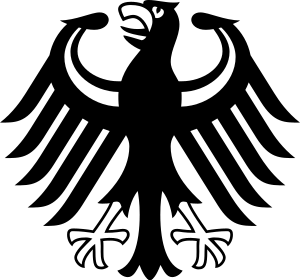Ministry of Economics and Technology of Germany facts for kids
| Bundesministerium für Wirtschaft und Technologie | |
 |
|
| Agency overview | |
|---|---|
| Formed | 23 October 1917 as the Reichswirtschaftsamt |
| Jurisdiction | Government of Germany |
| Headquarters | Invalidenstraße, Berlin-Mitte |
| Minister responsible |
|
| Website | www.bmwi.de |
The Federal Ministry of Economics and Technology (which in German is called Bundesministerium für Wirtschaft und Technologie) is a very important government office in Germany. It's like a special department that helps manage Germany's economy and technology. It was first started in 1949.
Over the years, this ministry has changed its name and responsibilities a few times. For example, in 1971, it briefly joined with the Ministry of Finance. Later, in 1998, it added "Technology" to its name because it started handling technology-related matters. From 2002 to 2005, it even included "Labour" (work) in its name.
But since late 2005, it has been known again as the Federal Ministry of Economics and Technology. This means it focuses on making sure Germany's economy is strong and that new technologies are developed and used.
Contents
A Look at the Ministry's History
This ministry has been around for a long time and has had different names as its jobs changed. Here's how its name has evolved:
- 1917-1919: It was called the Reich Economy Office.
- 1919-1945: It became the Reich Ministry of Trade and Commerce.
- 1946-1949: It was known as the Administration Office for the Economy.
- 1949-1998: It was simply the Federal Ministry of Economics.
- 1998-2002: It added technology and became the Federal Ministry of Economics and Technology.
- 2002-2005: It combined with labor, becoming the Federal Ministry of Economics and Labour.
- Since late 2005: It's back to being the Federal Ministry of Economics and Technology.
How the Ministry is Organized
To do all its important work, the ministry is split into different sections, like teams working on specific tasks. It has nine main departments. One department handles all the daily office work, while the others focus on different policy areas.
Main Departments of the Ministry
Each department has a special letter and job:
- Z - This is the Central division. It takes care of all the general administration and keeps things running smoothly.
- E - This department deals with European Affairs. It works on economic matters that involve other countries in Europe.
- I - This is the Economic Policy department. It helps decide how Germany's economy should work.
- II - This department focuses on Middle Class Policy. It supports small and medium-sized businesses, which are very important for the economy.
- III - This is the Energy Policy department. It works on how Germany gets and uses its energy, like electricity and gas.
- IV - This department handles Industrial Policy. It supports different industries and factories in Germany.
- V - This is the International Economic Policy department. It deals with Germany's economic relationships with countries all over the world.
- VI - This department works on Communication and Post Policy. It helps manage things like phone services and mail.
- VII - This is the Technology Policy department. It helps develop new technologies and encourages innovation.
Agencies Working with the Ministry
The ministry also works with several independent agencies that help it do its job. These agencies report to the ministry:
- Federal Cartel Office (BKartA): This agency makes sure that companies compete fairly and that no single company becomes too powerful.
- Federal Office of Economy and Export Control (BAFA): This office helps control what goods are exported from Germany and supports businesses.
- Electricity, Gas, Telecommunications, Post and Railways Federal Network Agency (BNetzA): This agency regulates important services like electricity, gas, phone lines, mail, and railways.
- Federal Agency for Foreign Trade (bfai): This agency helps German businesses trade with other countries.
- Federal Institute of Materials Research and Examination (BAM): This institute tests materials to make sure they are safe and work well.
- Physical Technological Federal Institute (PTB): This institute works on very precise measurements and standards for science and technology.
- Federal Institute of Geosciences and Raw Materials (BGR): This institute studies Earth sciences and helps manage Germany's natural resources.
Leaders of the Ministry
Many different people have served as the head of this important ministry over the years. They are called Federal Ministers.
Federal Ministers of Economics (1949-1998)
(From 1971-1972, it was the Federal Ministry of Economics and Finance)
- 1949-1963: Ludwig Erhard
- 1963-1966: Kurt Schmücker
- 1966-1972: Karl Schiller
- 1972: Helmut Schmidt
- 1972-1977: Hans Friedrichs
- 1977-1982: Otto Graf Lambsdorff
- 1982: Manfred Lahnstein
- 1982-1984: Otto Graf Lambsdorff
- 1984-1988: Martin Bangemann
- 1988-1991: Helmut Hausmann
- 1991-1993: Jürgen Möllemann
- 1993-1998: Günter Rexrodt
Federal Minister for Economy and Technology (1998-2002)
- 1998-2002: Werner Müller
Federal Minister for Economics and Labour (2002-2005)
- 2002-2005: Wolfgang Clement
Federal Ministers for Economics and Technology (since 2005)
- 2005-2009: Michael Glos
- 2009: Karl-Theodor zu Guttenberg
- 2009-2011: Rainer Brüderle
- 2011-2013: Philipp Rösler
Federal Ministers for Economic Affairs and Energy (since 2013)
- 2013-2017: Sigmar Gabriel
- 2017-: Brigitte Zypries
Where the Ministry is Located
The main office of the ministry is in Berlin-Mitte, a part of Berlin. It's in a group of buildings that used to be a medical school and an old hospital. There's also a second office in Bonn-Duisdorf, which used to be an old army barracks.
 | Aaron Henry |
 | T. R. M. Howard |
 | Jesse Jackson |

